AudioCulture
The noisy library of New Zealand music
Te pātaka korihi o ngā puoro o Aotearoa
King Loser
At odds with everyone, including each other, King Loser became the new band to see in New Zealand in the early 1990s, especially when the band line-up settled in 1995 with the arrival of drummer Lance Strickland (AKA Tribal Thunder) and guitarist Sean O’Reilly.
Born Celia Patel, Pavlova (later Mancini) was barely back in NZ after three months in the USA when she met Heazlewood (AKA Hazelwood) in Auckland in 1991. It was a chance encounter that threw up a new collaboration in King Loser and prompted the pair’s shift to Dunedin, Heazlewood’s hometown.
Over the next six years the abrasive duo would record three progressively better albums for Flying Nun Records and issue a string of challenging singles on NZ, European and American labels.
At odds with everyone, including each other, King Loser became the new band to see in New Zealand in the early 1990s.
Septic Hagfish
Guitarist Heazlewood had already spent a busy late 1980s and early 1990s uncaging his guitar and whatever else was needed in anarchic Dunedin noise collective Sferic Experiment, who had a comprehensive compilation, Bunny Liver, out through Xpressway Records in 1989. Two retrospective releases – the four song single Sci Fi/ Hi Fi, and career compilation Eight Mile, followed in 1994 and 1996 on San Francisco’s Drunken Fish Records.
More immediately, Heazlewood was the front man guitarist for the avant-rock Olla, whose slender three-piece line-up belied their sound and power. Septic Hagfish, a solitary extended single on Flying Nun Records in 1991 promised much, although the group soon foundered. Drummer Lesley Paris (Look Blue Go Purple, The Puddle) had another life as an indie record company executive and second guitarist O’Reilly headed south, where he joined third wave Flying Nun Records group, Chug, for their debut album, Sassafras.
The prolific Heazlewood would manage two cassette tape releases under his own name. Ratfink A Boo Boo was captured between March 1989 and January 1990 and featured regular offsider O’Reilly. Hellmouth 66, notable for including the song Heazlewood would name King Loser after, arrived as an Xpressway Records tape in 1991.
Meanwhile, Pavlova (keyboards, bass, vocals) was doing time as guitarist and vocalist in Christchurch all women rockers The Stepford Five with Joanne and Sharon Billesdon (guitar, drums) and Reta La Quesne (bass, vocals). The group’s sole recording session produced six songs that would turn up on vinyl in the coming years.
Spanish label Demolition Derby released a four song EP in 1991, which included the sexually aggressive ‘Nursery Baby’ that also appeared on the strong Christchurch scene tape compilation Freak Scene. A split single on Demolition Derby introduced ‘Snake Lady’ in 1993. ‘Little Sister Of Satan’ didn’t arrive until 1996 on All Kindsa Girls, a Munster Records (Spain) compilation of woman rockers.
Born in Auckland, Pavlova spent much of her musical life in Christchurch, where she was in The Axel Grinders, managed Into The Void, and sang in The After Dinner Mints – in pub residencies, at racehorse launches and champagne breakfasts.
“An unwholesome mix of primitive rhythm and mesmeric guitar solos…”
Early live outings captured the imagination of reviewers, who found much to comment on in the group’s sound, look and demeanour. Onstage before S.P.U.D and Straitjacket Fits on April 16, 1992, King Loser had Duane Zarakov (“the world’s only relevant Pink Floyd fan”) on drums. Precocious RIU scribe Matthew Hyland observed:
“So are they the combined South Island jihad that will rid Auckland of its joke-funkers and sub-Seattle trad rockers or just another celebrity game show?” Hyland asked. “It’s impossible to estimate the value of a great name for a start and they’ve certainly got that. They’ve already been tagged 'surf music' on the basis of one and a half songs, but that ignores Hazelwood’s blisteringly ironic monologues and the way his guitar turns from lithe sex machine into terrorist weapon in the blink of an ear, not to mention the sullenest bass, spine chilling-est backing vocals and most wildly, Zarakovish drums in Christendom.”
Shifting to the Powerstation in mid-July with The Chills, King Loser were “shoved to the front of a stage crowded with supergroup equipment, crawling with roadies, their intimate-macabre music floating out a high rise PA to a sparse crowd,” RIU’s Donna Yuzwalk wrote, adding, “They seduce, in a chilly way, with an unwholesome mix of primitive rhythm, mesmeric guitar solos and off kilter vocals shared by Celia (on bass in green velvet) and guitarist Chris Hazelwood, who looks like the mutant offspring of Cliff Richard and Phil Judd and plays guitar like a demonic schoolboy. Zarakov, centre-stage for once, flails zonked out rhythms out of a fucked up old drum kit.”
After a South Island tour with Straitjacket Fits, King Loser (with James Kirk drumming) were back yet again at The Powerstation on August 21 with The 3Ds.
“King Loser defy catagorisation. They incorporate bluesy twangs with Soundgarden-ish wails all based on more power chords than Electricorp knew existed. They open with a hellishly bulldozing instrumental before kicking into ‘Get On Your Bike and Ride’ with similarly axial guitar and surprisingly easy to grasp lyrics (i.e. the title repeated a hundred times),” RIU reported.
“In any case it’s the resplendently orange Celia Pavlova that stands out, without a doubt Auckland’s answer to The Pixies’ Kim Deal. There’s something reassuring about a woman gripping a large black bass whilst wailing in ecstatic agony to a large crowd of people.”
Super Sonic Free Hi Fi
With enthusiastic and articulate press and tastes turning to darker hues of rock, King Loser’s time was looming. They released their first album, Super Sonic Free Hi Fi, via Belgian label Turbulence Records in 1993. Introducing the blend of hyper surf guitar, droning organ and instrumental skronk which marked the Dunedin-then-Auckland based group out from the rest, it’s an uneven work full of noisy promise that is only well realised when Peter Jefferies and James Kirk are drumming.
Fronting up with The 3Ds at Auckland’s Gluepot on November 19, 1993, the musical drum stools continued with old friend Sean O’Reilly in the seat.
Heazlewood’s promiscuous guitar was still being heard elsewhere as well.
Heazlewood’s promiscuous guitar was still being heard elsewhere as well. He is at his instinctive best on the manic instrumental ‘Surf Shitty’ (with Gregg Cairns drumming), which was filmed in Dunedin in late 1991. (The blistering live track featured on video compilation X Way Vision that appeared through Drag City Records in 1992.) ‘They Slaughter Small Children’ was a single on Turbulence Records and ‘Surf’s Up In Malibu’/ ‘Skronk’ appeared on Flying Nun Records. Both were released in 1993. The Dead C’s Trap Door Fuckin’ Exit compilation of the same year featured six Heazlewood contributions, including the ‘Mighty’/ ‘Power’ single, recorded in Port Chalmers in December 1989 and January 1990.
Celia was also busy telling Dun fanzine that she was active mixing Piki Riwai and playing with and recording George Henderson and Snapper in a feature titled Profiling Women in New Zealand Music, published in mid-1993.
Never Hear Surf Music Again
The records just kept coming in 1994. James Kirk and Duane Zarakov were the drummers on King Loser’s Tie Us Down EP on US indie Eighteen Wheeler Records, which included ‘Never Hear Surf Music Again’ and ‘Matchstick Men’. ‘Stairway To Heaven,’ backed with ‘Exit The King’ had Shayne Carter on guitar for the flipside, and drums from the mysterious Bo Martack (The Verlaines and Dead C’s Robbie Yeats, incognito).
More mysterious was King Loser's surprising but appropriate (given their respective sounds) collaboration with Māori guitar great, Billy TK. Recorded in 1994 in a Waiheke Island studio, the album never emerged and it is unclear whether it was ever finished. No tracks have ever surfaced and it is rumoured that the studio held onto them after not being paid.
New Zealand music show Frenzy caught up with Pavlova and Heazlewood in Auckland's Myers Park ahead of a November national tour. The interview played on the late Thursday night TV3 music show on October 6, 1994.
With Chris playing the “straight” man, Celia was clearly on for a rave. “Political correctness. I’m not into it. Being a woman – wommin? – and wearing a short dress on stage and lots of lipstick – I love makeup – seems to rub some people up the wrong way. (The guitar) is not a phallic instrument, it’s a noise thing for me. I’m glad it’s 1994 and there’s a backlash against being politically correct.”
Which helps explain the night at the Las Vegas Strip Club in Auckland. Celia: “It (the club) had red velvet curtains and a mirror ball and gilt mirrors and this catwalk down the middle. The manager was an old fashioned character, but we got to know him and convinced him to let us play.
“We made up a lot of strip music in the old fashioned style and invited all our friends and it was a great night, very special. Sure, for a lot of people it wasn’t politically sound, with the naked girls. But it was a style thing. The whole scene fitted. And what’s the big deal about a bit of flesh?”
In Dunedin, mid-November 1994, King Loser could be found in the Provincial Hotel’s subterranean Cellar Bar with Steve Dean drumming. Chris banging out his dirty surf inflected rock, Celia heckling him onstage and locals such as Roy Colbert looking out over dewy pints. At one point, Celia jammed a match between the keys of the electric organ to get a sustaining drone, before resuming bass.
More Heazlewood collaborations – this time with Dunedin’s Alastair Galbraith – appeared in 1994 with ‘Nocturnal’ on Intro Version (Roofbolt Records), ‘International Smoker’ on Runner (Next Best Way compilation CD) and ‘Dark March’ on a Trinder Records compilation CD. Heazlewood and Pavlova both contributed to Trash’s Trash Not Gate 1994 CD on US indie New World of Sound.
By the time King Loser signed to Flying Nun Records in 1995, Lance Strickland was permanently behind the drum kit.
Then it got really busy. By the time King Loser signed to Flying Nun Records in 1995, Lance Strickland was permanently behind the drum kit. As Tribal Thunder, he played a big part in the group’s next phase. Strickland, who’d been the percussive force in S.P.UD, was a talented multi-instrumentalist just as comfortable on second guitar. He powered up The Osterbergs’ Stooges-loving rock, and after their name change to Freakpower, brought a Seattle influenced sound to the fore. Strickland also had hardcore act Lube (with future members of Balance), Virginia Reel and Kilstik keeping him busy in the early to mid-1990s.
Troubled Land
Sonic Super Free Hi Fi was re-released in 1995, this time on Flying Nun Records, who followed it up with King Loser’s You Cannot Kill What Does Not Live, another bitsy effort, which had consolidated their sound to include effective boy/ girl duets from Chris and Celia. Standout songs include ‘’76 Comeback’, for which a video was made, the tribal rumble of ‘Shake Your Wings’, a version of the apocalyptic modern folk perennial ‘Morning Dew’, along with a take on Dick Dale’s ‘Misirlou’. Incidentally, Tribal Thunder was the title of a 1993 Dick Dale album.
King Loser were out and about with Shaft at Auckland’s Squid in mid-February 1995, playing ‘Surf’s Up In Malibu’, set finale ‘Surfarama’, and ‘Surf Lost’ with new songs’ ‘You Follow, You Fail’ and ‘Morning Dew’.
RIU caught up with them for an April 1995 feature. They find the “tarnished treat of a band” soon butting heads over a magazine interview Chris has given. Celia then waxes angrily about past slights of Christchurch bands. The past was always alive in King Loser, musically and personally. Then they click into a rap about the group’s numerology:
“It’s really good,” Chris observes.
“I’m a three, Lance is a six, and Chris is a nine – it’s a triangle,” Celia adds as peace is temporarily restored.
Chris set fire to Tribal Thunder’s cymbals as Celia karate danced before Urge Overkill at The Powerstation.
King Loser – “showbiz personified” – supported Dinosaur Jr at Auckland Town Hall on March 29. It was one of three international showcases they played that year. Chris set fire to Tribal Thunder’s cymbals as Celia karate danced before Urge Overkill at The Powerstation on September 26, 1995. They returned to the Auckland club Squid, playing support for Alex Chilton on December 4.
In July 1995, King Loser took it to New Zealand again, this time with Sean O'Reilly back on guitar. They were a “proper” band now; a proper band capable of an improper sound that could be messy and irregular, teetering on tracks that struggled to contain them.
Badge or Medallion?
As Heazlewood – one of a number of different spellings and name variations he’d use – the King Loser kingpin had the more strictly song-based ‘Badge or Medallion’/ ‘Speed’/ ‘Aero’ single out on Flying Nun Records in 1995. It was one of his best recordings. He’d use the solo moniker again in 1996 for Introducing The Ron Asheton Club, a multi-song instrumental release on new Auckland indie Crawlspace Records. Celia’s contribution to Snapper’s ‘Lock and Load’ on the second LP ADM also appeared in 1995.
A main stage spot at January 1996’s Big Day Out introduced King Loser to their biggest audience yet. They followed it with a featured spot on Nunfest, Flying Nun Records' national 15th anniversary celebrations and label showcase.
Despite Celia claiming Flying Nun Records was trying to silence her, she got her two cents' worth across to Ian Hughes in a TV interview in St Kevin’s Arcade on Auckland’s K’ Road.
Despite Celia claiming Flying Nun Records was trying to silence her, she got her two cents' worth across.
Asked about a commonly held comparison to Pulp Fiction, which highlights Dick Dale’s surf classic ‘Misirlou’, Celia says, “It just makes us look like fashion victims.” “Yeah, rather…” Chris rejoins. “It appears like we’ve been riding on the wave of rehashed popular culture from the last thirty years.”
“What’s the appeal of surf music?” Hughes then asks Chris. “The rising surf, he answers. “The tribal stomp,” O’Reilly counters. “The nationalistic fervour?” says Chris. “Drum roll, please,” last word to O’Reilly.
They’re all togged out. Chris in a brown nudie suit shirt. Lance in a flowing silvery cream shirt. Celia dressed fine and colourful as usual.
Asked about instrumentals, Chris replies, “why ruin good music with bad words?”
And vinyl? “No one here’s got a CD player,” Chris says, sidestepping record collector tropes.
King Loser's third and final album Caul of the Outlaw, the angle for the TV interview, was released in 1996. Featuring a powerful 'Troubled Land' (their deep voiced conversational Spahn ranch update of 'Morning Dew'), it's an assured and cohesive record if a little light on new ideas. They released three solo singles that year, from everyone except Lance, who as Tribal Thunder released a strong, Heazlewood assisted six-song tape, Master of None.
With Mushroom Records' deal with Flying Nun Records providing money
for touring to Australia, King Loser crossed the Tasman with Loves Ugly Children and Garageland. They were a diverse bunch and when King Loser and Garageland proved incompatible travelling companions, Heazlewood and co. crammed into Love's Ugly Children's transportation.
The clock was well and truly ticking when King Loser returned for a University Orientation tour in February and March 1997. A powerful performance at Wellington's Bar Bodega had a thuggish intensity about it and the onstage dynamic had shifted from Celia and Chris to the twin guitars of Chris and Sean O'Reilly. All things considered, the show, like King Loser's six-year run was still more fun than friction. A tonic for the times rather than a drag on them.
King Loser briefly reformed in September 2016 with eight shows nationwide.
Celia Mancini died on 6 September 2017.
--
In 2023 King Loser, a documentary about the band directed by Andrew Moore and Cushla Dillon, made its debut at the New Zealand International Film Festival. For more detail, and to watch the trailer, go to NZ On Screen. To watch the complete documentary, it can be rented and streamed at AroVision.
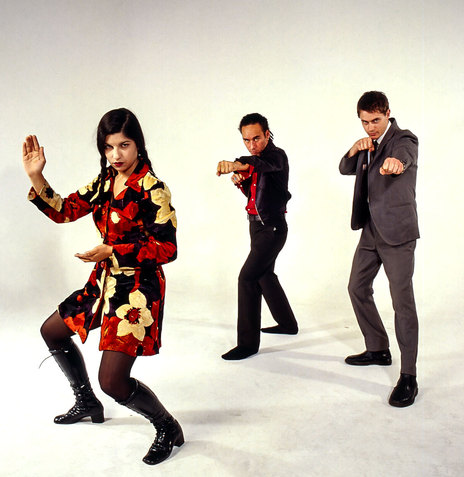
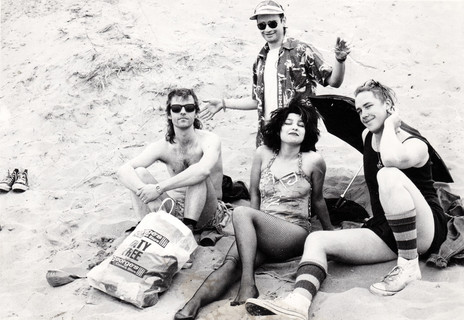
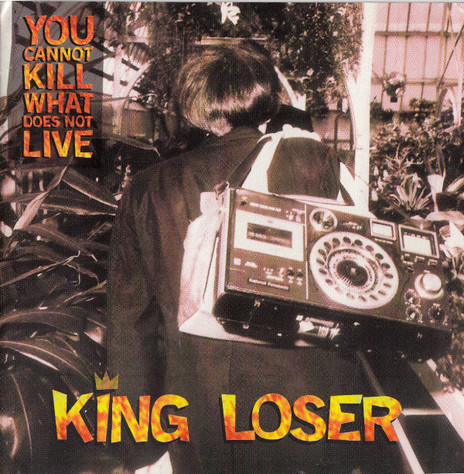
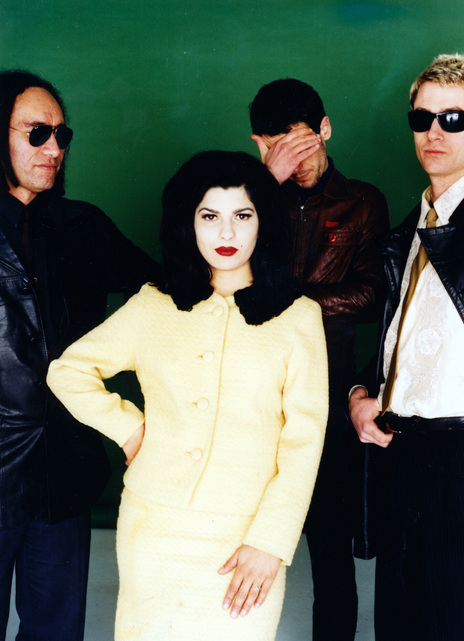
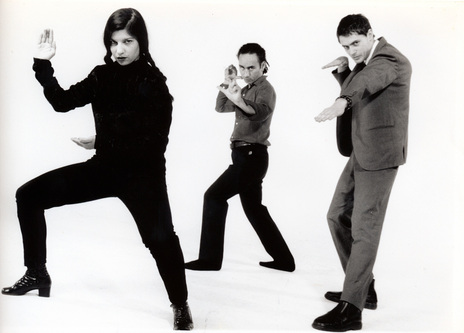
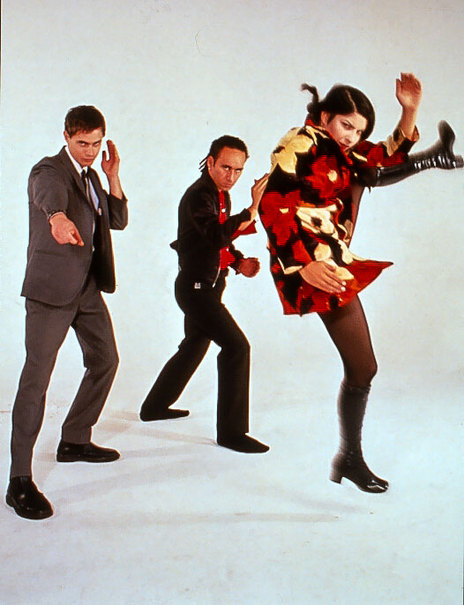
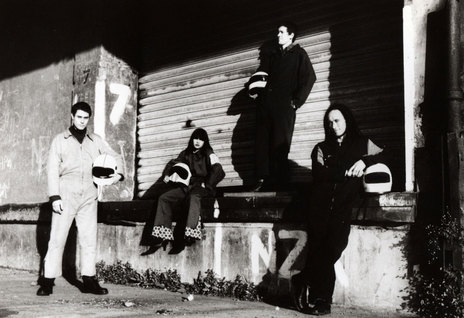

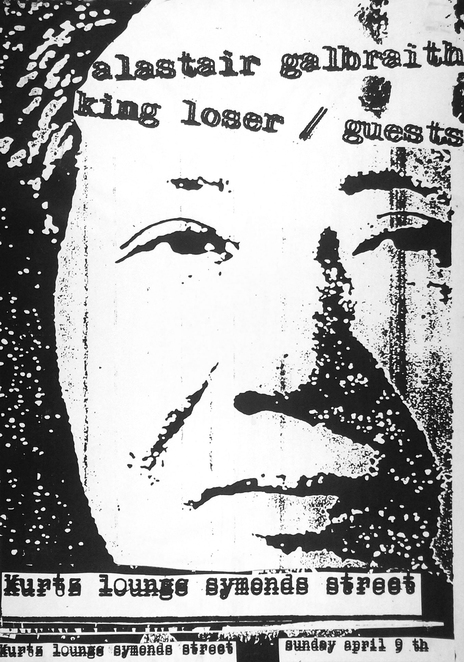
Chris Heazlewood - guitar, vocals
Celia Patel (also Pavlova/ Mancini) - keyboards, vocals
Duane Zarakov - drums
Steve Dean - drums
Lance Strickland - drums
Sean O’Reilly - guitar
Glen Campbell - vocals
Members of the group were banned by their record company from talking to the media.
King Loser covered Bonnie Dobson's folk classic Morning Dew.
King Loser was formed by S.P.U.D.'s vocalist Glen Campbell, who dropped out of the group early.
Visit our sister site
NZ On ScreenMade with funding from
NZ On Air



